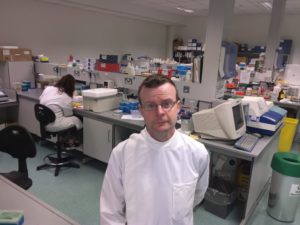The utility of exhaled breath condensate to detect sub-clonal mutations in early stage lung adenocarcinoma

During Lung Cancer Awareness month 2020, we are delighted to announce that Professor Bryan Hennessy, Royal College of Surgeons in Ireland has received a HRCI-HRB 2020 co-funding scheme award with Breakthrough Cancer Research the charity partner. Prof Hennessy will investigate “The utility of exhaled breath condensate to detect sub-clonal mutations in early stage lung adenocarcinoma.”
Lung cancer is the biggest cancer killer with a 5-year survival of 15%. However early stage disease is more easily treated and has a much better prognosis. Computed Tomography (CT)-based screening programs are causing a shift in diagnosis to earlier stage disease. An in-depth exploration of these tumours shows that different parts of individual patient tumours have diverse genetic profiles (mutations). The differences in these profiles are thought to fuel recurrence of the cancer after curative surgery. There is no good evidence for how best to monitor patients after curative surgery or predict those patients whose disease is more likely to relapse. Determining how and when this will occur is an area of considerable research interest.
Blood samples have been investigated as a “liquid biopsy” to derive information about a patient’s lung cancer genetic profile. Taking blood samples from patients to assess this genetic information is far safer for patients than invasive biopsies. Furthermore, these changes can be monitored over time. The largest study to date monitoring patients with early stage lung cancer using blood samples was recently published. This showed that although blood could detect important changes that predicted recurrence, it was only successful in less than half of patients. More importantly in patients with adenocarcinoma (the most common type of lung cancer) the success rate was less than 1 in 5 patients. Although promising, it is clear that blood-based testing is not always reliable for clinical use and needs to be improved.
Our group has previously published a study showing that important mutations can be detected in the breath samples of patients with lung cancer. Indeed, the breath analysis outperformed blood-based testing. This study will investigate whether we can use breath analysis to detect genetic mutations that predict recurrence. This information is important in determining treatment decisions. We believe we can use our breath tests to meaningfully compliment the current blood-based approach and use this to improve outcomes for lung cancer patients
Dr Nicola Cosgrove, a post-doctoral researcher on this research explains more about this research in the video below.









 Contact
Contact